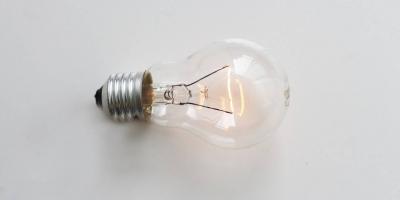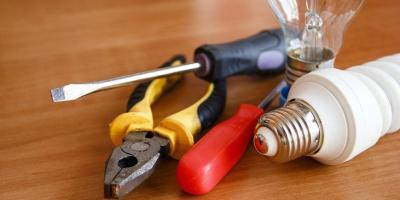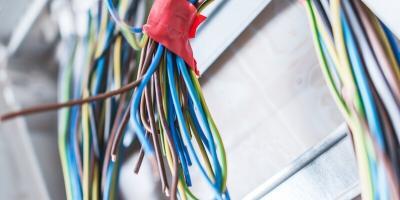Our reliance on electricity makes us vulnerable from many different electrical hazards.
In Sydney, many households are experiencing electrical safety risks. If electricity is widely recognised as dangerous, why is it there are still many people injured from using it?
Electrical hazards can result in electric shock, electrocution, burns and house fire. These are possible with every improper handling of electrical issues. Perhaps you haven’t seen or experienced any of these before, and that’s why it’s easy to ignore it.
But don’t wait to experience these electrical hazards before taking actions. With the right attitude and mindset, you and your family can prevent the risks that electricity poses. On that, this article will tell you the types of electrical hazards and how to avoid them:
Faulty Wiring
You can usually hear investigators suggesting that faulty wiring is the preliminary cause of house fires in many news reports. It’s the most typical electrical hazard at home. As common as it is, you forget that it’s possible to happen in any home, including yours.
Faulty wiring can quickly overheat due to circuit overload. On that, never overload your circuit by using enough appliances and equipment that your main panel can only sustain. But to solve your issues in electrical wiring, seeking inspection from licensed level 2 electricians is the best option.
Improper Grounding
Many of us forget why grounding exists in appliances and machines. When there is excess voltage flowing in your appliances, the metallic ground pin in it becomes vital in transferring unwanted voltage to the ground. For that, never remove the metallic pin and observe it is properly grounded to prevent electrocution and electric shocks.
Wet Hands in Using Electrical Appliances
You are asking for trouble when you plug appliances with wet hands. Water is a good conductor of electricity. By touching wires and electronics with wet hands, there’s a high chance you can receive shocks or get electrocuted. The danger is even more severe with sweaty palms as sweat increases the chances of an electrical shock than water.
As a rule of thumb, always make sure your hands are dry when plugging devices. Another way to prevent getting electrocuted is with a residual current device (RCD) in your outlets. RCD cuts off electricity when it detects someone is receiving a shock, so it’s better to have this in your home.
Pouring Water in Electrical Fire
The usual perception of putting off a fire is by pouring water on it. An excessively high voltage can trigger a fire in your home. And by splashing water to an electrical fire, it fuels the fire and can cause electrocution.
Keep a fire extinguisher to help you when an electrical fire emerges. If you don’t have one nearby, make sure it’s easy to turn off your power supply, and you have an emergency contact list at your home. If the fire gets worse, evacuate your place and call the fire brigade.
Unprotected Electrical Outlets
Kids are curious about anything, including your outlets at home. Children may plug their fingers to electrically live outlets. Protect young kids by using plastic closures to cover any outlets within their reach.
The permanent way to make your outlet safe for your kids is to use safety wall plates. These plates will automatically snap close the moment you remove a plug from the outlet. In this way, it protects your entire family from the potential danger of electric outlets.
Improper Use of Extension Cords
Using extension cords to increase the number of appliances you can plugin is dangerous. It can lead to a circuit overload, resulting in a higher chance of electrical fire in your home. If you can’t avoid using one, make sure that you’re not using it with too many appliances at once.
If you badly need to use it, fix extension cords in place to avoid someone from tripping on it. But never use extension cords as a permanent substitute for an additional socket. If you need to plug in more appliances, opt to install more electrical outlets in your home.
Using Defective Appliances
Touching metal parts of defective appliances may lead to electrical emergencies. Make sure you won’t use such devices to prevent getting electric shocks and prompt have them safely removed by junk removal professionals. You can fix this issue by reading the appliance manual guide, seeking an electrician or simply replacing it.
Electric Outlet Near Water Sources
Have you ever imagined why many people get electrocuted while taking a bath? Naturally, it’s because they are near an electrical source. Placing outlets near water sources like the sinks, bathrooms and kitchens have a high possibility of electrical mishaps. Always install outlets at a fair distance from these locations.
Overheating Light Bulbs
Using a light bulb with a higher wattage than the lamp can overload the wiring. Overloading can then overheat the lamps triggering an electrical fire. Use a lesser wattage of light bulb to your lamp’s socket to avoid any mishaps from happening.
Damaged Power Poles
It’s necessary to take extra care when seeing fallen or damaged power poles. These poles carry extremely high voltage, and any contact with it can result in electrocution and burns. Always maintain a safe distance from these poles and avoid touching anything attached to it.
Conclusion
Electricity can be dangerous, but many people give less attention to it, resulting in more electrical injuries. On that, it’s vital to get informed on what to do when encountering any electrical hazards. It also depends on what precautionary measures you will take to prevent such mishaps in the future.
Gordon Powers is here to help you avoid any types of electrical hazards in your home and premises. Our level 2 electricians can inspect your electrical wiring, equipment and appliances to prevent any electrical mishaps. In case you have leaning or damaged power poles near you, we can remove and replace it as soon as possible.
Don’t hesitate to call us at (02) 9199 7480 today, and we’ll help you solve any electrical hazards.










